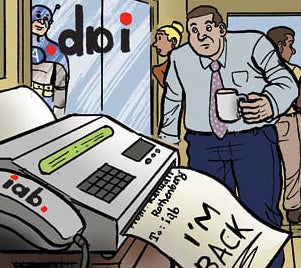It’s like that line from “The Godfather: Part III”: “Just when I thought I was out, they pull me back in.”
OG ad tech entrepreneurs just can’t seem to stay away from ad tech.
Case in point: Firsthand, a startup that describes itself as an “AI-powered brand agent platform,” which was launched last year by Jonathan Heller, a co-founder of FreeWheel, and Michael Rubenstein, former president of AppNexus. They first met back in the day at DoubleClick.
In early March, Firsthand raised its $26 million Series A to invest in product engineering and hiring, with plans to double headcount to around 50 or 60 people by the end of this year.
But what the heck is an “AI-powered brand agent platform.” Ad tech is an industry brimming with buzzwords, but so is AI.
Strip away the jargon, however, and the concept is simple, according to Heller. Rather than finding an audience online and showing it a message, Firsthand aims to help brands and publishers use AI to communicate directly with their customers online.
That could mean anything from presenting people with information based on what they’re reading or watching, serving up answers in response to specific questions or taking actions on a person’s behalf, like automatically adding items to a cart.
The idea is to weave these interactions into the digital experience and throughout the customer journey “in a way that’s very human,” Heller said.
“Generative AI isn’t just a technology,” he said. “It gives us a brand-new way of engaging with the consumer.”
Heller and Rubenstein spoke with AdExchanger about what that means in practice.
AdExchanger: When you say you’re weaving generative AI throughout the customer journey, make that real for me.
AdExchanger Daily
Get our editors’ roundup delivered to your inbox every weekday.
Daily Roundup
JONATHAN HELLER: Take a financial services company that has multiple types of customers with different needs: small business owners, people nearing retirement, families on a budget.
When someone engages with a piece of publisher content about a particular topic, it gives some indication of who they are and what they’re interested in. But if you marry that with information from a brand, you can surface specific products and services through an agent depending on the person’s needs.
And as that person continues to engage with the agent, which is cooperatively produced by the publisher and the brand, their experience will adapt on the fly. It’s a far more efficient way to understand consumer intent and unlock the value of a publisher’s content in a way that’s also valuable to advertisers.
Publishers need to build sustainable businesses, and there are a lot of forces at work today eroding their ability to do that. We’re helping them shift, in a sense, from selling ads to selling agents that build relationships.
So publishers and brands are feeding their data and content into an AI agent. What safeguards and controls do you have in place to make sure they can maintain ownership of their data and their IP and decide how it’s being used?
JH: A core component of our platform is called Lakebed, which is an intellectual property and copyright management system that we built.
AI agents can make use of more than one company’s data to help a consumer, but in a way where everyone’s data is siloed and protected and isn’t shared with anyone. The agents are also told what they’re allowed to know as well as what they should and shouldn’t do.
If you run an agent on your own site, it’ll know your information and be able to help consumers when they arrive. If you include an agent in a campaign and buy it as a paid media opportunity across publishers, it can draw on a blend of knowledge from the brand and the publisher, but safely and securely.
Which AI models do you use?
JH: We support a wide selection of models – ChatGPT, Gemini, Claude – and we did that on purpose. Different enterprises have a preference for certain models, and these models change so rapidly that you need to be able to plug and play. We think of models as cartridges, essentially.
What makes your approach different from all of the other AI and agentic tools we’re seeing flood the market?
JH: There’s a lot of good work happening now in terms of applying AI to make advertising work better and more efficiently: smarter ways to bid, more efficient ways to create messaging, better brand safety assessments.
But those solutions are about making an ad show up in front of a consumer. We’re focused on making an agent show up in front of a consumer that can offer new, adaptive experiences.
What was your experience of raising money today compared with, say, 15 years or so ago when AppNexus and FreeWheel were raising their Series A rounds?
MICHAEL RUBENSTEIN: Over the years, there’s been reticence in the venture community to invest in ad tech, but that’s a stigma that’s less relevant today. It’s really helpful, too, in this environment – or any environment – that we’re both founders with a track record who’ve built multiple companies.
But we’re also lucky to work with VCs like Radical Ventures, which led our Series A, and FirstMark Capital [which participated]. Radical Ventures has backed some of the most promising early-stage AI companies out there, and FirstMark was an early backer of companies like Shopify and Pinterest.
We get along well and we all see the huge opportunity here.
This interview has been lightly edited and condensed.
For more articles featuring Jonathan Heller, click here.

















